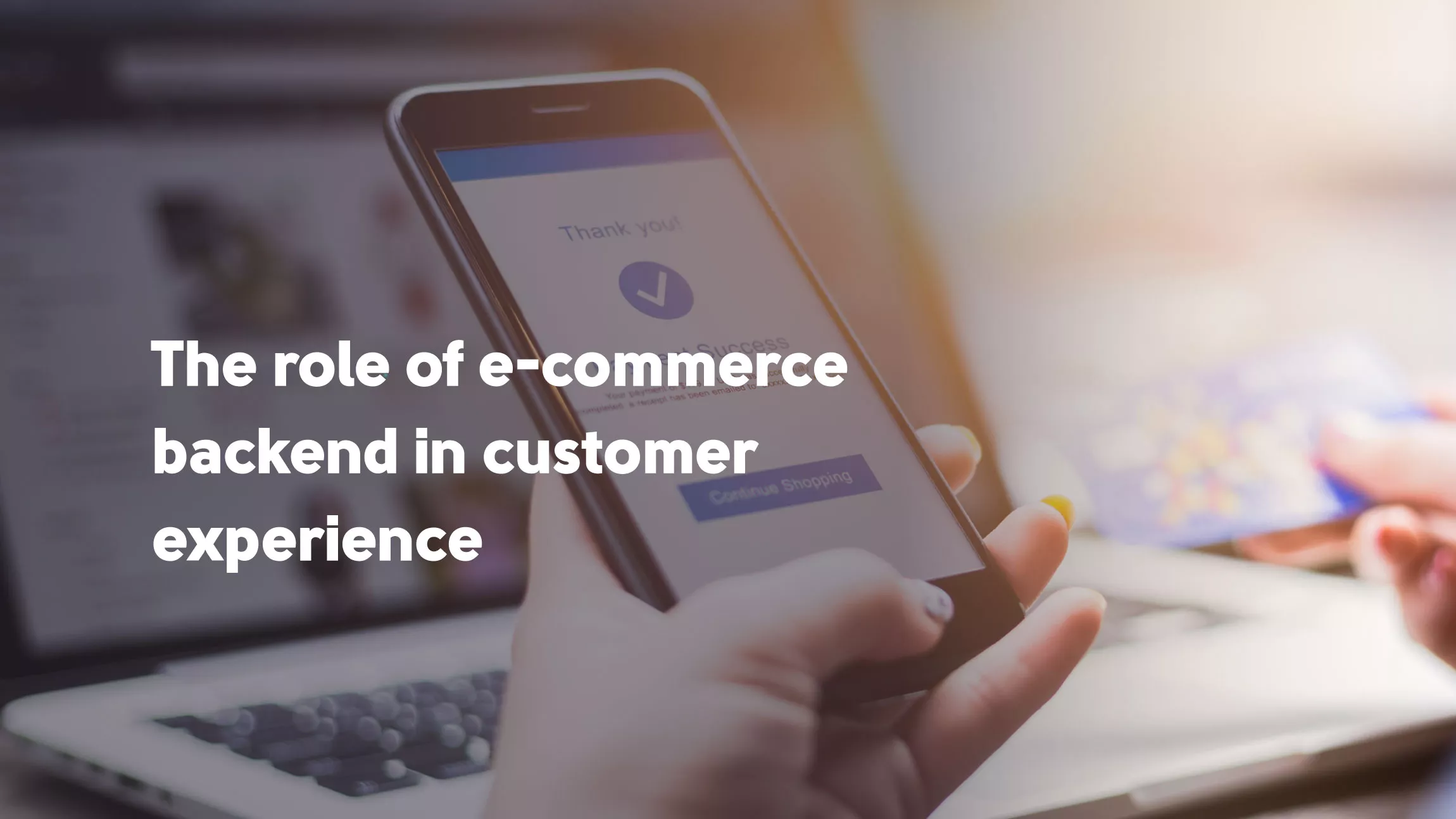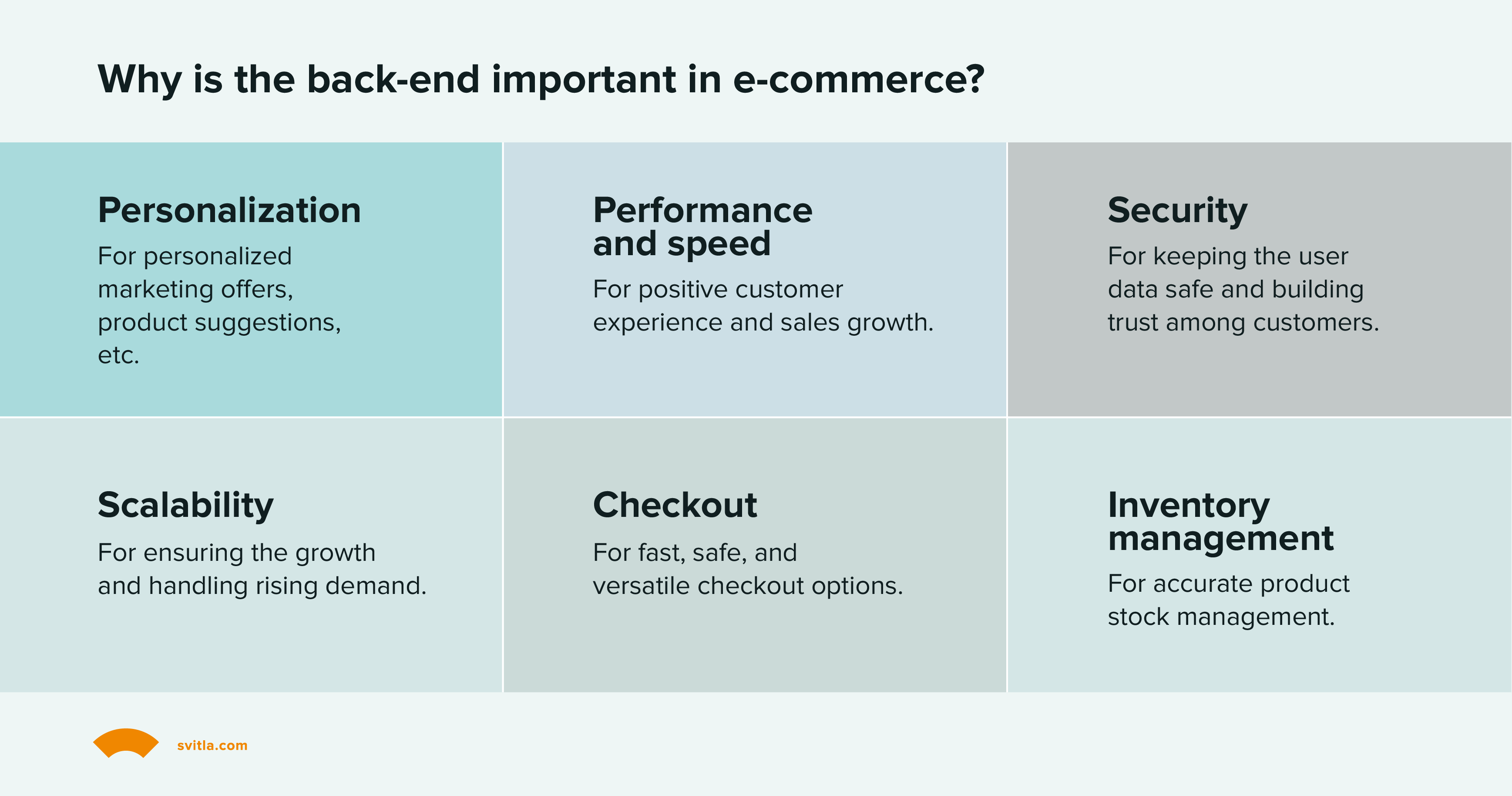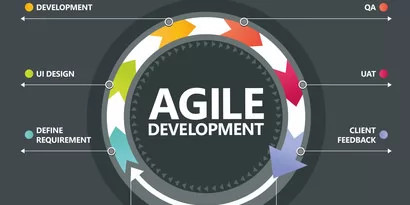
The Role of E-commerce Backend in Customer Experience
E-commerce systems have gained significant importance in the contemporary business landscape as they enable enterprises to offer a streamlined and effective shopping experience to their clientele.
But, what is an e-commerce system? Widely, e-commerce systems are considered web-based applications that facilitate commercial transactions between businesses and customers by providing a virtual platform for the sale of goods and services. Simple, right?
Well, e-commerce systems can be complex when considering it comprises multiple tools and technologies, including a shopping cart, payment gateway, and inventory management system, that synergistically facilitate a seamless and hassle-free online shopping experience.
During and after the pandemic, the rise of e-commerce proliferated beyond what anyone could have predicted. At break-neck speed, it appeared as though almost every person was ordering things online, relying on e-commerce giants like Amazon or eBay for everyday items. Smaller brands began to rise to the demand and scrambled to get an e-commerce system out quickly to accommodate those users who were now pouring into the online shopping world.
This proliferation of e-commerce has revolutionized the retail sector and altered the purchasing behavior of customers. Contemporary customers demand a seamless and tailored retail encounter, demanding that companies adjust their operations to stay ahead in the market.
A robust e-commerce system is pivotal in ensuring a satisfactory customer experience through the provision of user-friendly navigation, secure payment processing, and expedited shipping. By implementing an optimal e-commerce backend, enterprises can optimize their workflows, enhance client contentment, and ultimately boost their sales and revenue.
This article will delve into the significance of e-commerce backend in enhancing the customer experience and emphasize the need for businesses to give priority to this facet of their online operations.
What Is Customer Experience in E-commerce?
In the highly competitive market of today, stores need to do everything they can to stand out and generate organic customer loyalty. Cue customer experience as it can make or break your business.
First and foremost, the customer experience is important because it has a direct effect on how satisfied customers are. When people have a good time interacting with your business, they are more likely to come back and tell others about it. If they have a bad experience, on the other hand, they are likely to take their business elsewhere and tell others about it.
Not to mention, how customers feel about your business can affect your bottom line. Typically, when a customer has a good experience with a product or service, they are ready to pay more for it. This means that stores may be able to increase their sales and profits by putting more money into the customer experience.
Customer experience is also important because it can help businesses set themselves apart from their competitors. In today's market, where many stores sell similar products at similar prices, the customer experience can be the deciding factor for customers when picking where to shop. By giving customers a unique and good experience, stores can stand out from the crowd and get more customers.
Lastly, the way customers feel about your business can also tell you a lot about how to make it better. By asking customers for feedback and analyzing what they say, businesses can figure out where they're doing well and where they need to improve. This can help them make choices based on data that improve the customer experience and lead to more loyal customers and more money.
Why Is a Backend Necessary in E-commerce?
The customer experience is one of the most crucial aspects that affects the growth of an e-commerce website. Backend development is a key part of how an e-commerce site's customers interact with it. It is in charge of making sure that the website and all of its parts work well, from the checkout process to managing the supplies. In this piece, we'll talk about how important backend development is to a customer's experience on an e-commerce website.
Personalization
In e-commerce, personalization is becoming more and more important. Customers want experiences that are unique to them and meet their preferences and wants. Backend developers are in charge of designing and putting in place personalization features like targeted marketing campaigns and personalized tips. These features can make customers more interested and loyal, which can lead to more sales and keep customers coming back.
Performance and Speed
The performance and speed of an e-commerce website are critical factors that significantly impact the customer experience. Backend developers are tasked with optimizing website performance to ensure fast loading, smooth operation, and avoidance of peak traffic crashes. Optimizing website loading speed is crucial for customer retention and sales growth. Backend developers employ diverse methodologies to enhance website performance, including caching and code optimization.
Security
The security of an e-commerce website or mobile app is crucial. Customers trust websites and mobile apps that keep their personal and financial information safe and secure. Backend developers are in charge of putting in place security measures, like encryption and secure links, to keep the website and customer data safe from being accessed by people who shouldn't be able to. Any security holes can hurt the image of an e-commerce site, which can lead to customers losing trust and sales going down.
Scalability
To accommodate the growth of your e-commerce business and the increase in traffic and orders, your backend system needs to be scalable. This entails managing substantial volumes of customer data and transactions without experiencing slowdowns or crashes.
Checkout Process
One of the most important parts of an e-commerce website is the checkout process. A simple and fast checkout process can lead to more sales and happy customers. Backend developers are in charge of creating and putting together the checkout process and making sure it is easy for customers to use. The checkout process should be made as fast and safe as possible so that customers can buy things quickly and safely.
Inventory Management
Inventory management is another important part of an e-commerce website. Backend developers are in charge of designing and putting in place systems for managing inventory, making sure that stock amounts are accurate and up to date. This helps stop overselling and running out of stock, which makes customers happier and more likely to buy from you again. A good method for managing inventory also speeds up shipping times, which can make the customer experience better.

Benefits of a Better E-commerce Backend for Business
As stated, e-commerce businesses need a good backend because it directly affects the customer experience and, in the end, the success of the business. So, what benefits can e-commerce businesses expect by having a great backend for their website or mobile app?
Scalability is one of the best things about having a great backend. As an e-commerce business grows and gets more customers, the backend must be able to handle the increased traffic and orders without slowing down or crashing. A scalable server can also be used to add new features and technologies, which helps the business stay competitive and meet customers' changing needs.
A good backend can also make order handling, inventory management, and shipping faster and more accurate. By automating these processes and doing as little work by hand as possible, companies can reduce the chance of mistakes, speed up fulfillment, and make customers happier.
Also, the backend has a lot to do with how customers act, which affects their total experience. For example, slow loading times, system crashes, and other mistakes can make customers angry and cause them to leave their shopping carts or write bad reviews. On the other hand, a quick and easy checkout process, personalized suggestions, and easy access to a customer's order past can make them happy and encourage them to buy from you again.
It's important to remember that a good customer experience is not guaranteed just by having a good front end. A website or mobile app that looks good can bring in people, but if the backend is slow, unreliable, or missing key features, it can be a bad system overall. For example, even if a mobile app looks nice and is easy to use, it can be frustrating to use if it takes too long to start or keeps crashing.
Last, but certainly not least, it’s important to remember that backend data helps businesses learn more about customer behavior, tastes, and trends, which can help them make more sales. Here are some ways that e-commerce companies can use data analytics from their backend systems to increase sales:
Detect high-performing products: By looking at sales data, businesses can figure out which products are selling well and make changes to their marketing and stocking plans to reflect that. They can also use this information to cross-sell or up-sell related goods to customers, which will raise the average order value.
Personalize the customer experience: Back-end data, like a customer's purchase history and browsing habits, can give you useful information about how they act. Businesses can improve customer trust and make more sales by using this information to personalize the shopping experience. For instance, a business can use a customer's buy history to make personalized product suggestions or offer promotions that are relevant to the customer.
Optimize prices and promotions: By looking at sales data and how customers act, businesses can find strategies for pricing and promotions that work well with their target group. They can also change prices and deals in real time based on what customers say and how sales are going.
Improve customer service: Data from the back end can tell you about customer service measures like response times and customer satisfaction scores. By using this information to improve customer service, businesses can make customers more loyal and get good word of mouth, which can lead to more sales.
E-commerce Backend Integration with Third-party Systems and API
For new e-commerce entrepreneurs, determining the optimal e-commerce APIs, tools, and technologies to start operations can be a challenging task. Operating an e-commerce company requires a diverse array of functionalities that go beyond the mere act of selling goods from your digital storefront via your e-commerce platform. To optimize the performance of your e-commerce platform, it is recommended to use a variety of third-party software solutions that simplify mission-critical functions like inventory management or customer service.
There are many options available for e-commerce sites, including popular platforms like Shopify, BigCommerce, or Magento. As a site grows, it's important to collect data that can be processed using third-party analytics tools and data stores, requiring a specialized API for your specific e-commerce solution. The key is to choose the API that enables seamless data transfer from your e-commerce platform to other applications and systems.
In addition to selling your products on your own website, you might also want to sell them on Amazon, Etsy, or eBay. For the best results, your e-commerce website or mobile app should be able to quickly connect to an Amazon API or an eBay API which let you easily add new products and prices to your storefronts whenever you change things on your main website.
E-commerce storefronts need to connect to payment gateways like PayPal so that customers can pay for their purchases in the way they want, whether that's with a credit card, debit card, bank transfer, or even cryptocurrency. The best e-commerce API for payment gateways can instantly connect the checkout system on your e-commerce website to a third-party payment gateway that takes care of these problems for you. Payment gateway APIs also improve the user experience and make it easy to stop fraud.
Customer Relationship Management (CRM) software is a powerful tool that enables your sales, marketing, and customer service teams to track every interaction they have with customers. With CRM, you can stay on top of customer contacts across various channels, including phone, email, website, and social media. By keeping a record of every interaction, it becomes much easier to deliver an exceptional customer experience. A CRM integration enables you to quickly export customer data to a centralized location, such as a data warehouse or data lake.
Frontend and Backend as the Components of One E-commerce System
When making an e-commerce site, the frontend and backend are two important parts that need to work well together to give customers a smooth experience. The frontend is the part of the platform that people use, like the website or mobile app. The backend is the server-side processes and databases that run the platform.
As you well know, the frontend of an e-commerce platform needs to look good, be easy to use, and work well on a variety of platforms. In a nutshell, it should make shopping easy and smooth for customers, from looking at goods to making a purchase.
In stark contrast, the backend is in charge of crucial jobs like processing transactions, keeping track of inventory, and handling customer data. It needs to be dependable, safe, and scalable so that it can handle more traffic and process a lot of data.
Data integrity is important for keeping the frontend and backend of an e-commerce website in sync with each other. Data must be correct and consistent for inventory management, processing transactions, and giving users accurate information about products. When the backend isn't handled well, wrong data and mistakes in transactions can happen, which hurts the customer experience.
Another important part of the integrity and balance of an e-commerce site is that users can get to data quickly and don't have to wait long for it. The frontend needs to be optimized so that it takes as little time as possible for pages to load. This will make it easy for customers to find goods and buy them quickly. The backend needs to work well and be able to handle deals and update stock in real time.
Search engine optimization (SEO) is another important part of keeping an e-commerce site stable and in good shape. SEO must be done on the frontend to make it easy for customers to find goods through search engines. At the same time, the backend must be optimized for search engine bots to make sure that all product information is properly indexed. Without proper SEO optimization, the exposure of the platform can go down, hurting sales and the customer experience.
Customer experience in e-commerce: conclusions
Optimizing the customer experience for e-commerce platforms is important for any online business that wants to give its customers a smooth and easy shopping experience. One way to do this is to work with an experienced custom software development provider with proven experience in e-commerce development.
A reliable custom software development partner like Svitla Systems can help you build and maintain a backend system that can handle massive loads of customer data and transactions without slowing down or crashing. Partners like Svitla Systems can also ensure your back-end system is optimized for search engine optimization, data security, and quick access to data with as few wait times as possible.
Working with a reputable partner like Svitla Systems for your e-commerce endeavors can concretely help you as follows:
- Expertise and experience: Svitla Systems delivers experience and know-how when it comes to making e-commerce solutions, giving clients sound and proven advice based on what we’ve learned from working on similar projects.
- Better security: We can help you make sure that your backend system is safe from cyber threats and secure. Across all our projects, we put in place strong security steps to protect sensitive data, like credit card numbers and personal information, about your customers.
- Scalability: As your business grows, your back-end system must be able to handle more customers and sales. Svitla Systems can help you build a backend system that can grow and change as your business does.
- Cost savings: Svitla Systems helps you build a back-end system that is strong and scalable and can handle a lot of activities without having to buy expensive new hardware.
Care to learn more? Contact our team to discuss how we can kickstart your next best e-commerce project.
Let's discuss your project
We look forward to learning more and consulting you about your product idea or helping you find the right solution for an existing project.
Your message is received. Svitla's sales manager of your region will contact you to discuss how we could be helpful.




